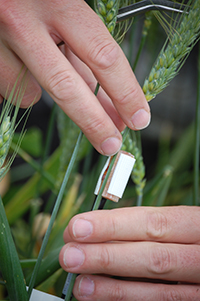
 This project continues the research conducted by the AGFACE team on wheat traits responsive to elevated carbon dioxide (eCO2). The current study is investigating functional traits for the eCO2 environments in which any new wheat cultivars will have to grow. Breeding for traits that can respond to eCO2 and maximise yields while maintaining protein content is a strategy proposed for improving future productivity.
This project continues the research conducted by the AGFACE team on wheat traits responsive to elevated carbon dioxide (eCO2). The current study is investigating functional traits for the eCO2 environments in which any new wheat cultivars will have to grow. Breeding for traits that can respond to eCO2 and maximise yields while maintaining protein content is a strategy proposed for improving future productivity.
Traits investigated in this AGFACE study were selected because they were expected to take advantage of the CO2 “fertilisation effect” by increasing yield or yield potential under eCO2.
The traits tested were: high carbohydrate storage capacity; limited tillering capacity; reproductive sink strength; transpiration efficiency; and nitrogen use efficiency. The data collected will inform crop simulation models to predict yields across the landscape, providing advanced analysis of future yields and knowledge to pre-breeders about effective traits for selection under eCO2.
The benefit of a high stem carbohydrate storage capacity seems most relevant during dry seasons and this benefit is not altered by eCO2. The CO2 response is not modified by the carbohydrate storage trait, at least not in the relatively high yielding environments encountered during this study.
Tillering increased under eCO2 in both free and inhibited tillering lines / cultivars, but the relative ranking in tillering was maintained. The reduced tillering trait was maintained under eCO2, with little evidence that restricted tillering limited yield and growth responses to eCO2 in the tested environments.
High transpiration efficiency remains expressed under eCO2. It appears to be even more effective, and provides greater yield benefits, under a high CO2environment.
The nitrogen use efficiency study tested the effect of three traits in reversing the reduction of grain protein under eCO2. Initial analyses from the first year of data show differences between the tested lines in yield, root growth and baking quality response to eCO2.
An ongoing AGFACE study is studying these wheat traits under drought and heat stress to determine whether different lines can improve crop productivity and provide improved responses under stress in an eCO2 atmosphere. Analyses of nitrogen use efficiency data from the 2015 growing season will be completed in 2017.
| Title |
Excerpt |
|---|---|
| AGFACE fact sheet (2014) | Fact sheet profiling the project Australian Grains Free Air Carbon dioxide Enrichment program. |
| Sabine Tausz-Posch - AGFACE results: Traits | Presented by Sabine Tausz-Posch, University of Melbourne, at the AGFACE Crop Science Workshop. |